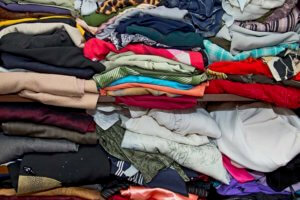BLOG

Hoarding Clean Up & How You Can Help
While many people collect all sorts of items in their lifetime either as a hobby or for sentimental reasons, people with a compulsive hoarding disorder will often feel a strong need to collect and keep on collecting large amounts of items.
If you suspect that someone you know such as a friend or family member is a hoarder and would like to offer them assistance, below is some information on hoarding disorder, hoarding clean up and how you can help the hoarder in your life.
What Is Hoarding?

Hoarding is a psychological disorder where a person gathers an excessive amount of items, stores them in a space that is already at capacity, and ultimately has difficulty parting with possessions.
Signs and Symptoms Of Hoarding Disorder
Common signs and behaviours of people with hoarding disorder include:
- Acquiring objects unnecessarily and in excess, despite not having enough space to keep them
- Inability to throw away or part with possessions, particularly items with little to no monetary value
- Becoming extremely attached to items and belongings to the point where they won’t let others touch their possessions
- Experience extreme distress and anxiety about throwing out items or just at the thought of disposing of their possessions
- Believe that they need to save things for the future
- Feeling safe when surrounded by possessions
- Living in a space that is overfilled with their possessions
- Believe that their belongings are unique and special even if they are similar
- Other associated symptoms include: difficulty with making decisions, organising belongings and concentrating
What Do Hoarders Collect?

Some examples of common everyday items that hoarders collect include:
- Paper including newspapers & magazines
- Books
- Clothes
- Food
- Rubbish
- Rotten food
- Containers (boxes, plastic bags, storage containers, bottles etc.)
- Animals
- Human waste
Supporting A Person With A Hoarding Disorder

Hoarding disorder can be difficult for some to understand at first. While some of the behaviours of hoarders may seem illogical or upsetting to friends and family members, it is important to provide a supportive environment to encourage hoarders to seek help and enable recovery.
Below are some of the do’s and don’ts when it comes to assisting a loved one:
- Find Out More About Hoarding – hoarding disorder is complex and can stem from various underlying issues. By educating yourself and finding out more about hoarding disorders and how it affects your loved ones, you can get a better idea of their situation and develop more empathy and understanding to their needs.
- Don’t Throw Away Their Belongings – be sure not to touch, move or throw away your loved one’s possessions without asking if this is ok first. Doing so will break their trust in you, create emotional distress and may also destroy your relationship with your loved one.
- Offer Assistance – hoarders often have a tough time with making decisions and can find the whole process of decluttering emotionally distressing. By offering to help your loved one, you can motivate them throughout this entire process while offering a helping hand, sorting through their items, and providing guidance and emotional support.
- Don’t Enable The Hoarding Behaviour – try to avoid situations where you could potentially encourage hoarding behaviour. Examples include gifting your loved ones with more items to add to their hoard, inviting them out to visit garage sales or second-hand stores and offering to store their possessions for them.
- Encourage Your Loved One To Seek Professional Help – encouraging a hoarder to seek help from professionals is a great first step towards recovery. Assist them to research local therapists, support groups as well as specialist cleaning companies who have years of experience with hoarding clean up.
Need A Specialist Biohazard Hoarding Clean-Up?
If you or your loved one needs help with a biohazard hoarding clean up, the team at National Trauma NTCSC are here to help. With over 30 years’ experience in specialist cleaning services, we offer round the clock 24/7 availability to ensure you get the help that you need, whenever you need it. Our team are fully certified and experienced when it comes to remediating a property back to a habitual state and can be at your doorstep ready to start in next to no time.
Call our team today for an obligation free quote for our hoarding clean up services.

